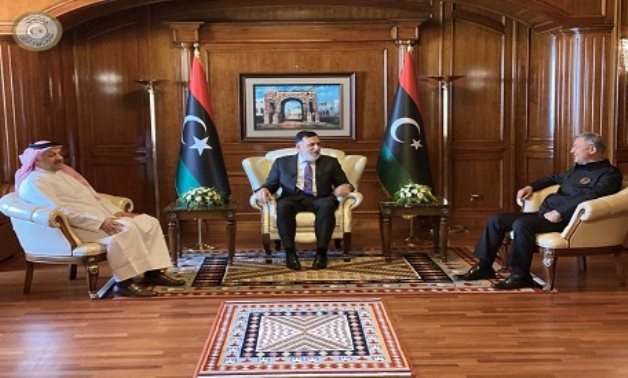
Libya's Prime Minister of the GNA Fayez al-Sarraj meets with defense ministers of Turkey, Hulusi Akar, and Qatar, Khalid bin Mohammad Al-Attiyah, in Tripoli, Libya August 17, 2020. Reuters
CAIRO – 19 August 2020: Source at the Libyan National Army (LNA) told the Middle East News Agency (MENA) that the defense ministers of Qatar and Turkey visited Prime Minister of Tripoli-based Government of National Accord (GNA) Fayez al-Sarraj on August 17.
The parties agreed that Qatar would send military consultants to assist in the commanding of the militias protecting the GNA, which is an interim non-elected government that is recognized by the United Nations. Furthermore, Turkey contemplates establishing a military base in Misrata.
On the other hand, Commander of the LNA Khalifa Haftar received on Tuesday the Egyptian Chief of Military Intelligence Khaled Mgawer who delivered a message from President Abdel Fatah al-Sisi.
Turkey's Intervention in Libya
In December 2019, Turkey signed with the GNA two MoUs on defense and gas drilling in the Mediterranean.
Spokesperson of the Libyan National Army (LNA) Ahmed al-Mesmary had stated early in July that Turkey has transported into Libya 25,000 mercenaries. Those include 17,000 Syrian militants, 2,500 Tunisians who fought in the ranks of the Islamic State (IS) in Idlib and Aleppo, and other nationalities including the Sudanese.
Libyan tribes announced the closure of oil ports and fields in January as the revenues were used by the GNA to pay militants. Early in July, the tribes declared that oil facilities would resume operations. However, the LNA announced on July 11 that such facilities would remain closed until the demands of the Libyan people on dismantling militias are fulfilled. The Libyan National Oil Corporation (NCO) announced that the value of revenues lost until present is $6.5 billion.
Turkey has also sent 2,500 – 3,000 officers and military experts to co-command the operations rooms of the Government of National Accord (GNA) militias and to pilot drones from mainly Tripoli's Mitiga Airbase. The LNA downed around 70 Turkish drones as they were targeting its concentrations.
The LNA announced downing on July 23 a Turkish reconnaissance plane west of the Libyan city of Sirte, which is currently controlled by LNA forces.
On July 22, the LNA warned Turkey against approaching the Libyan coasts, threatening to target any hostile naval vessels in the Libyan waters.
On July 5, several "unknown aircraft" launched nine strikes against Oqba Bin Nafea Airbase located in Al Watiyah controlled by the GNA – which is an interim non-elected government that is recognized by the United Nations - and Turkey. The outcome was the destruction of Hawk air defense systems, and a Koral electronic warfare system as well as the killing of a Turkish commander, and six officers as the operations room they were in was hit.
However, Commander of Mobilization at the LNA Khaled al-Mahgoub stated on July 20 that Turkey still uses Oqba bin Nafea airbase in Al Watiyah western the country to bring in military reinforcements less than a month from losing air defense and electronic warfare systems in strikes by "unknown flights."
The LNA's commander of mobilization unveiled on July 25 that Syrian mercenaries transported by Turkey are being turned into police forces by the Ministry of Interior affiliated to the GNA.
The GNA was formed as per the 2014 Skhirat Agreement expired in 2017, and that failed to achieve its purpose, which is ending the civil war and unifying the affiliation of the country's institutions. There is another interim government that is based in Tobruk eastern Libya and that was formed by the elected Libyan House of Representatives convening in the same city instead of Benghazi given the circumstances. Benghazi currently constitutes the headquarters of the LNA.
Egyptian Warning
The Libyan Armed Forces restored Sirte in January, and was advancing in the outskirts of Misrata and Tripoli. However, early in June, it lost Al Watiyah and Tarhouna, which was its last stronghold western the country, retreating into Sirte and Al Jufrah. The Libyan army installed air defense systems in Sirte, while Al Jufrah already has a main airbase.
On June 20, Egypt's President Abdel Fatah al-Sisi declared Sirte and Al Jufrah in central Libya a red line that if crossed, Egypt's "direct intervention" becomes internationally legitimate.
That is because it is aligned with the UN Security Council resolutions on Libya and Berlin Conference imposing an arm embargo on Libyan factions, banning foreign intervention in the North African State, and advocating for a political solution. Furthermore, Egypt's intervention is requested by the elected Libyan House of Representatives and Libyan tribes.
On July 13, the Libyan House of Representatives issued a statement allowing the Egyptian Armed Forces to intervene whenever it perceives a threat to the security of Egypt and Libya describing Turkey as "the invading occupier."
On July 16, President Sisi met with Tribe leaders belonging to eastern, central, and western Libya in Cairo as they demanded Egypt's military support to repel Turkish aggression. "We will enter Libya upon the request of the Libyan people, and will leave it in compliance with the order of the Libyan people," the president stated.
On July 20, the Egyptian House of Representatives approved sending troops beyond Egyptian borders on the western strategic direction.
Comments
Leave a Comment